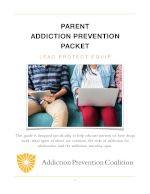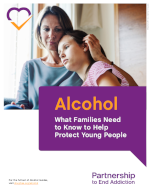The Power of Parents
Parents and Grandparents, did you know that you are the most powerful influencer on your children’s behavior? Believe it or not, teens still listen to you. In fact, kids usually listen to their parents more than anybody else, including their friends. In a recent survey on underage drinking, teens reported that parental disapproval is the #1 reason they choose not to drink.
My Child is...
Prepare to Take Action
If you’ve just discovered or have reason to believe your child is using nicotine, alcohol or drugs, the first thing to do is sit down and take a deep breath. We know this is scary, but you have resources to help you prepare for the important conversation ahead. Some brief preparation now can lay a foundation for more positive outcomes ahead.
- Gather any evidence
- Have a discussion with a counselor or an educated, trusted friend
- Get on the same page with your significant other
- Expect anger and resolve to remain calm
- Be prepared to discuss any addiction in your family
- Establish clear rules and consequence
- Plan small realistic goals for conversations
Keep Lines of Communication Open
Discovering that your child could be using substances stirs up a lot of emotion. The best way to find out what’s going on, and to begin helping, is to start talking. Normally, it will take time and many conversations to get to points of clarity and before your child is ready to seek help. It is important to learn how to have a conversation instead of a confrontation.
- Create a safe place to talk
- Remain calm and resist the urge or overreact
- Express how much you care
- Ask open-ended questions
- Give lots of positive feedback
- Listen more than you talk
- Thank your child for being willing to talk with you
Practice Positive Reinforcement
In households where a child is using substances, it can be easy to focus on everything the child is doing wrong and respond with lectures, punishment and confrontation. Unfortunately, this often only escalates the problems.
Instead, it is important to focus on what your child is doing right. This sounds simple, but it can make an enormous difference. When you notice the positive things your child is doing and reinforce them, there’s a stronger chance you’ll see those behaviors again.
- Develop a list of behaviors you would like to reinforce
- Choose a reinforcer that will be appreciated by your child
- Celebrate the small successes
Elementary Age
Resilience is the ability to bounce back from stress, adversity, failure, challenges, or even trauma. It’s not something that kids either have or don’t have; it’s a skill that kids develop as they grow.
Resilience helps kids navigate stressful situations. When kids have the skills and the confidence to confront and work through their problems, they learn that they have what it takes to confront difficult issues.
While the gut reaction of the parent might be to jump in and help so that the child avoids dealing with discomfort, this actually weakens resilience. Kids need to experience discomfort so that they can learn to work through it and develop their own problem-solving skills. Without this skill-set in place, kids will experience anxiety and shut down in the face of adversity.
Parents can help kids build resilience by:
- Building a strong emotional connection
- Promote healthy risk-taking
- Resist the urge to fix it and ask questions instead
- Teach problem-solving skills
- Label emotions
- Demonstrate coping skills
- Embrace mistakes – Theirs and Yours
- Celebrate positives
- Model resiliency
Middle School Age
If we really want our children to be equipped to both make good choices and stick to those choices in tough situations, we need to teach them how to say no. Tools for saying no are called refusal skills. and there are plenty of options for teens who want to turn down their friends without bringing repercussions on themselves.
The key is to discuss these strategies with your teen and role play with them before the peer pressure takes place. It is important for them to consider saying this to a friend that is pressuring them, not a person they don’t know or care about.
Some refusal strategies include:
- Avoid the situation
- Practice saying No
- State a Reason, Excuse or Fact
- Blame a parent
- Use humor
- Strength in numbers
- Change the subject
We hope you can be sympathetic to what your teen has to deal with as they learn to say no to their friends. This is hard for them, but it is also doable. When teens have strategies in place, when they know how to say no without drawing attention to themselves, they will feel better about their own choices, and you’ll feel better about those choices too.
High School Age
We know teens are incredibly savvy when it comes to their knowledge about substance use, and they need information and messages based in real life. This is a pivotal time for parents to help their kids make positive choices about substances. Be knowledgeable and equipped to have honest conversations.
Make sure your teen also knows the rules and the consequences for breaking those rules — and, most importantly, that you really will enforce those consequences. Kids are less likely to use nicotine, alcohol and other substances if their parents have established a pattern of setting clear rules and consequences for breaking those rules. Those consequences should be reasonable, enforceable and short-lived.
Share often what you find wonderful about them. They need to hear consistent positive comments about their lives, who they are as individuals and all of the wonderful things they have to look forward to if they are healthy and safe.
Show interest in and discuss your child’s daily ups and downs. You’ll earn their trust, learn how to talk to each other, and you won’t take them by surprise when you voice a strong point of view about substances. Teaching your teen that it is normal to discuss things they are concerned about and ask for help when they need it is one of the greatest gifts you can give them for healthy living.
Download your copy of the Parent Addiction Prevention Packet below:
Download your copy of the Alcohol Guide for Families below:
Download your copy of How Helping Kids Find their Natural High Leads to Healthy Choices below:
If you have a loved one who is struggling with substance use, you are not alone. Click here to learn more about Family Members Support group meetings.



